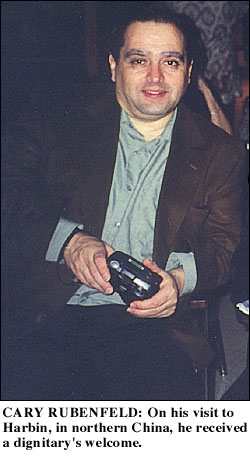
Rubenfeld's business is garden furniture and home & garden decor. He started Cary's Ltd., 25 years ago as an outgrowth of his involvement in commercial plant sales. The North End distributor has customers throughout North America.
"In the past, we used to buy our products from other manufacturers and designers," says Rubenfeld, a past board member of the Bnay Abraham Synagogue.
"We felt it would be better to do our our production and China is the best place to do it." Rubenfeld began traveling to China and South-East Asia in 2000. "The Chinese believe in guanxi - relationship building," he says. "You have to be introduced or referred."
The Winnipeg businessman was referred to factories and craftsmen in Fujian province in southern China. "The City of Xiamen is a centre for crafts," he reports. "Xiamen is an hour by plane from Hong Kong and across the straight from Taiwan. We get a good deal of our home and garden products from there now. (The furniture and ceramic-ware he has made in South-East Asia). We began dealing through trading companies but now deal directly with the factories in most cases."
Rubenfeld says that he has found doing business in China to be both challenging and rewarding, not only financially but also in terms of a cultural exchange and a learning opportunity. "The Chinese are very good business people," he says.
"They have taken to heart former Chairman Deng Xiao Ping's maxim that it is glorious to be rich. Over the last 20 years, China's economy is growing very rapidly."
He reports that the country's admission into the World Trade Organization two years ago was a big step forward and made it much easier for foreigners to do business in China.
The first areas of China that were opened to foreign trade and large scale economic development were the special economic zones in the south near Hong Kong and Pearl River Delta as well as Shanghai and the regions to the neighboring Shanghai. This has expanded throughout the country to the point where virtually every region is interested in growth and development as well as promoting exports abroad.
On this most recent trip, Rubenfeld traveled to Harbin in northern China to meet a factory owner he has been doing business with for a while through a trading company. He was given a dignitary's welcome complete with television interviews and a tour of the city by local officials.
Rubenfeld was in China during the recent Olympic Games. He notes that the Chinese were all glued to the their television sets cheering on their athletes.
"The Chinese have tremendous pride in their country," he says, "not unlike the Americans. They see themselves as a peaceful people who have to be strong to defend themselves.
"They are fearful of America, George Bush and what they see as U.S. policy right now because of the American intervention in Iraq and Afghanistan as well as the continued American quasi-support for Taiwan." Canadians generally are well liked thanks largely to the heroic work of Dr. Norman Bethune. The Canadian doctor who gave his life to help the Chinese communist revolution is still required study in the equivalent of Grade 6-7 throughout China.
Another popular Canadian is Mark Roswell an Ottawa born English-language teacher fluent in Chinese. The Chinese call him "Dashan" (literally big mountain because of his height). Roswell has a popular TV series called "Come Visit Canada with Dashan". Rubenfeld notes that almost everyone in China seems to be studying a second language or upgrading their skills. English is a compulsory language in schools.
"They also appreciate foreigners who try to speak in Chinese although they are always surprised when they meet a foreigner who does speak Chinese," he says. "I have a vocabulary of about 200 words now. I was told on this last trip that I should start learning the different intonations now."
He recalls that when he first started going to China, he would run into a lot of Israelis. Since the outbreak of this latest Palestinian conflict and the attack on the World Trade Centre, rarely does he come across Israeli businessmen now who are open about where they come from, while he is seeing more Arab businessmen in China.
In the interests of national security, the Chinese have made it more difficult for Middle Easterners to obtain a visa and permission to enter the country.
Rubenfeld will be returning to China in late November and again in April. "I may be there during Pesach," he says. "I have to figure out the logistics of what I am going to eat there."
He notes that many Chinese assume he is Muslim because of his dietary choices. "I often won't answer questions about my diet," he says. "It's okay to be inscrutable in China. Much about China still remains a mystery to me. I still have a lot to learn there."
Read Myron Love's People column every week in The Jewish Post & News. Click here to access our subscription form.